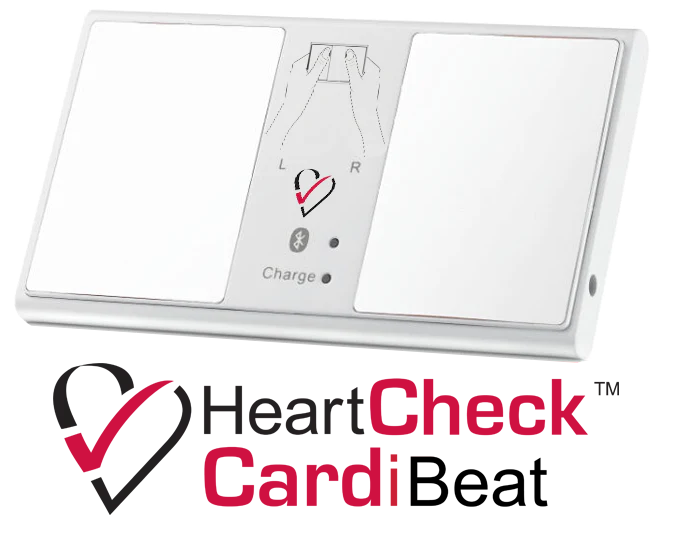TORONTO, ONTARIO – CardioComm Solutions, Inc. (TSX VENTURE:EKG) (“CardioComm Solutions” or the “Company”) confirms results from the use of the HeartCheck™ ECG Monitor were presented today at Vascular 2013 in Montreal. Researchers from three University of Toronto teaching hospitals and the Centre for Innovation in Complex Care developed the protocol for the national program that screened for Atrial Fibrillation (“AF”) as a risk factor for stroke in 1,334 participants.
The AF screening study was performed in association with the Heart and Stroke Foundations’ 2013 “Be Pulse Aware” Screening Campaign and was designed to test the feasibility and yield for AF detection in mass public-screening events. The HeartCheck™ ECG Monitor was chosen as the tool to detect AF by ECG compared to a manual pulse check. ECGs were then reviewed using the Company’s GlobalCardio ECG analysis software within the SMART Monitoring ECG services solution.
The population demographics selected for the study involved 1,334 participants, with an average age of 63 years representing an at-risk population for AF and stroke. The primary endpoint of AF detection by ECG was performed with adjudication by three independent cardiologists. The study examined the clinical relevance of single assessment population arrhythmia screening and the utility of ECG based screening versus pulse checks alone.
The ECG screening results demonstrated a notable 2.1% AF prevalence with new AF diagnosis found in 0.7% of screened participants. HeartCheck™ based ECG identification of AF was found to be superior to performing a manual pulse, where pulse check use had a poor positive predictive value for AF detection. Also found was that AF positive participants were in AF for the duration of the 30 second screening period.
“The population demographics indicated that study participants were representative of an at risk population based on age. The study methods showed the CardioComm Solutions methodologies and technologies were appropriate for the purposes of ECG acquisition and centralized ECG analysis in support of repeated public screening efforts for AF detection and provided credible ECG interpretations and arrhythmia diagnosis. With respect to the objective of the “Be Pulse Aware” campaign, we support adoption of such ECG screening solutions as it has proven valuable for identification of AF and to increase awareness for stroke prevention,” said the study’s primary author Dr. Karl Boyle, Consultant in Stroke Medicine, Addenbrooke’s Hospital, Cambridge University Hospital NHS Foundation Trust.
“I am glad the study has found incorporating the HeartCheck™, single-lead handheld ECG device is useful in community screening for AF. The study results have shown that pulse checks, even by an experienced health professional can miss AF and should not be relied on as a primary screening method,” said Dr. Chi-Ming Chow, Director of Echocardiography and Vascular Lab, and Director of Medical Informatics, Department of Medicine, St. Michael’s Hospital, Associate Professor at University of Toronto. “What we have seen is that new handheld ECG recording devices, with appropriate communication and ECG viewing software, are providing better and more accessible arrhythmia screening opportunities which should replace manual pulse checks for cardiac rhythm disorder detection.”
“CardioComm Solutions’ ECG monitoring products are unique. Our ECG management, viewing and analysis software (GlobalCardio and GEMS) have their own FDA and Health Canada clearances as Class II medical devices, in addition to those for the prescription and over-the-counter use of the HeartCheck™ handheld ECG devices. Class II device clearances are subject to additional special controls to assure safety and effectiveness. They are designed to perform as indicated without causing injury or harm to patient or users and are held to a higher level of assurance than Class I devices. The NET effect is that physicians can reliably use our credentialed software to render an ECG interpretation, a benefit not available with the majority of available handheld and patch based devices today. We welcome the publication of results from this large scale arrhythmia screening effort and confirmation the HeartCheck™ ECG monitors provided an easy and efficient AF arrhythmia screening solution and that AF screening efforts should not rely on pulse checks for AF detection. We believe these peer-reviewed findings will assist to increase the credibility for use of our devices and SMART Monitoring ECG service technologies in future studies,” said Etienne Grima, Chief Executive Officer of CardioComm Solutions.
More information regarding the HeartCheck™ products and SMART Monitoring solutions is available at the Company’s website www.theheartcheck.com.

